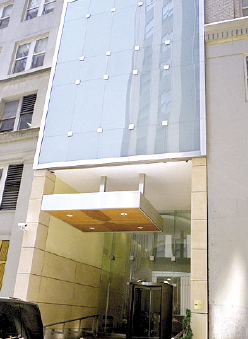
The Renaissance on John Street
While much of the real estate industry has focused on loosening credit for residential mortgages, the commercial market is beginning to show signs of a rebound that may help investors refinance billions of dollars of real estate loans.
About $20 billion worth of New York commercial real estate loans are scheduled to mature by the end of 2012, with about $12 billion of that in the office market. This means borrowers will need to pay off their balances or refinance, a potential death knell for underwater owners and developers.
“In a market like New York, which had extreme levels of trading activity at the peak of (the real estate boom), there’s going to be debt that needs to be refinanced,” said Aaron Jodka, senior real estate economist at Property and Portfolio Research, an affiliate of CoStar.
Most financial and legal experts say there’s a wide spectrum of properties in need of refinancing, and healthy properties with steady cash flow and solid owners comprise the lion’s share.
But some developers may not be so lucky.
For example, a developer may have gotten an acquisition loan with an 85 percent loan-to-value ratio based on projected rents. When those rents crashed after the economic downturn, the value of the equity investment may have been wiped out. So now any investor looking for a new loan will have to write a big check to a lender to refinance the deal. Lenders are demanding 35 to 40 percent equity deposits on new loans, instead of the more traditional 15 percent.
Another big factor that will decide the fate of these maturing loans is the CMBS market, in which pools of real estate loans are bundled and sold to investors. After having been dormant for more than two years, it is just starting to show signs of life. A healthier CMBS market could mean more money for refinancing and fewer foreclosures for borderline loans.
“There have been a number of recent securitizations that have gone extremely well,” said Anthony Orso, chief executive of a recently formed venture called Cantor Commercial Real Estate.
Orso and others cite a $1.1 billion CMBS offering by JPMorgan Chase, which marked the seventh successful sale of commercial property loans this year. Observers see this as a sign that investors are willing to invest in relatively small amounts of real estate debt as long as lenders are more transparent and diligent in their underwriting efforts. Origination of commercial mortgage-backed securities fell from $230 billion a year in 2007 down to about $3 billion in 2009, according to Cantor Commercial Real Estate.
Mike Tepedino, senior managing director at commercial brokerage Holliday Fenoglio Fowler, said that liquidity has improved significantly since January due to “spread compression,” meaning the rates for U.S. Treasury bonds have fallen so low that wealthy investors are looking for higher returns on fixed-income securities. “The spread compression is not being driven by real estate fundamentals getting a lot better; they just think that relative to everything else, real estate is looking more attractive,” said Tepedino, who is based in HFF’s New York office.
In the New York market, there are also signs that traditional lenders are also considering commercial refinancing, as places like Bank of America and M & T have begun staffing to expand the level of loans, according to legal and financial observers.
The easiest buildings to refinance in the current market appear to be multi-family apartment buildings with a steady flow of rental income, due in part to the fact that Fannie Mae and Freddie Mac are guaranteeing the loans on these properties.
Developer Laurence Gluck, who lost the massive Riverton Apartments complex in Harlem two years ago, is facing a maturity deadline at Independence Plaza, the 1,300-unit housing complex at 40 Harrison Street in Tribeca. Gluck, the president of Stellar Management, has a $236 million loan that is scheduled to mature in 2011, according to Trepp, a Manhattan-based research firm.
A spokesperson for Stellar said that Gluck has never missed a payment at the property and is in negotiations with lenders to extend the loan.
Meanwhile, the Moinian Group is in discussions on a deal to refinance the Renaissance, a 221-unit luxury tower at 100 John Street in Lower Manhattan. According to data from Trepp, the Moinian Group is 90 days late on an $84 million mortgage, and the borrower has requested a loan modification from LNR Partners, the special servicer on the loan.
According to documents obtained by The Real Deal, the property, which was 96 percent occupied as of March, was appraised at $61 million in May, giving it a loan-to-value ratio of 136 percent, compared with a 71 percent loan-to-value ratio in March 2007, when the property was appraised at $118 million.
Moinian Group officials declined to comment.
Other investors have had a much easier time getting loans refinanced.
In September, HFF closed an $81.5 million deal to refinance a four-property office portfolio in Princeton, N.J. Cigna Investments and AIG Global Investment Group agreed to refinance the office properties with a fixed-rate loan over five years.